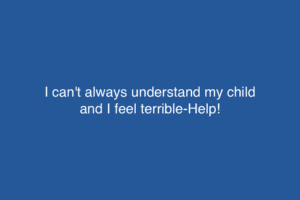
Hi. This is an answer to the parent’s question about, always feeling like she’s correcting her daughter.
I believe the um, question was, the comment was, that you have a daughter whose receptive language, or her comprehension or understanding, is much greater than her ability to express herself. That you’re feeling guilty when you don’t understand her, or have to ask for clarification. And I think that’s a legitimate concern or a legitimate worry, and it’s also the reality of what you live. So, depending on the age of your child, I would have a very honest open question, open-open conversation with your child to say “Mommy’s so sorry. Sometimes I don’t understand you, and I know that you’re “trying your best to help me understand. So, sometimes I need to ask you again, “or sometimes I’ll need to ask you to show me. “I’m really trying hard to understand what you’re saying because it’s important to me.” And I think what it does is it recognizes or helps your child recognize, that you really are trying to understand her and that you’re empathic to the fact that she has a lot to say, but is struggling. Also, depending on the age of your child, you might want to think about talking to a speech and language pathologist about some augmentative communication that might be able to help her make herself better understood. Adults who have difficulty making themselves understood can write a message down on a piece of paper. Um, that’s not always possible for a child. So, depending on their age, you may want to speak to your speech and language pathologist to see if he or she can help you come up with some augmentative systems or devices to help you understand your child better. But don’t beat yourself up. Your child knows that you love her. Your child knows that you’re trying your very best. So, have an open conversation with her, to let her know that you know, she has lots to say, and you-you are really interested in hearing it, but sometimes it’s just difficult for you to understand. Um, I don’t think that you need to worry so much about correcting her so to speak, because the way you asked it in your question, you were concerned that you were correcting her when you were saying “are you telling me that?” or “can you tell me again?” or “can you show me?” That’s not correcting her, that’s just really your effort to try and repair the communication breakdown that has been occurring. So, um, you know it would be different if she said something and you said: “no, don’t say that, say this”. That’s correcting, but that’s not actually what you’re doing, You’re just really making an honest effort to understand your child. If you have any other questions that you um, around any other questions or comments around this answer, you’re welcome to reach out to me at charrison@actlearningcentre.ca. I’m Canadian so, the center is spelled t-r-e instead of t-e-r. So, ActLearningCentre.ca, and I’ll be happy to add any more information than I can for you.



